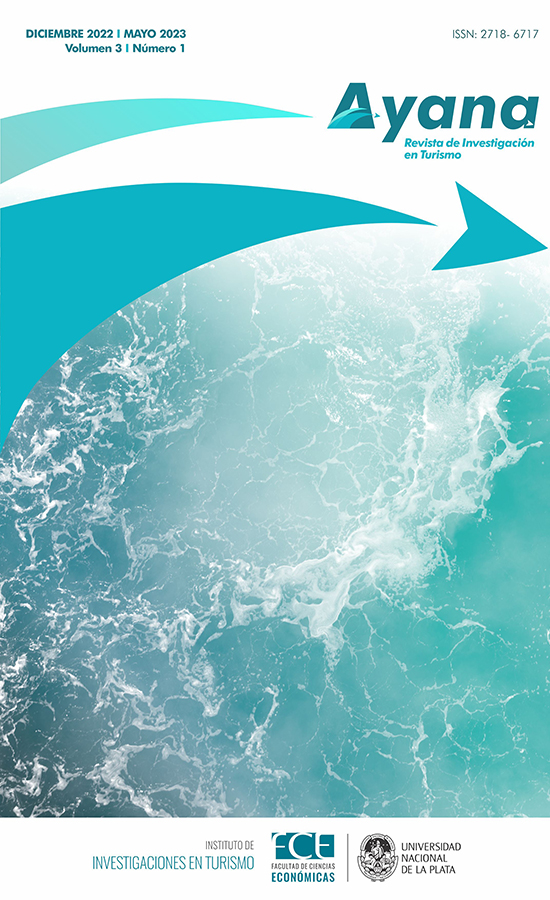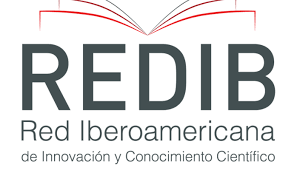Estudo bibliométrico da satisfação do cliente no segmento hoteleiro
DOI:
https://doi.org/10.24215/27186717e029Palavras-chave:
bibliometría, pesquisa, marketing, satisfação, turismoResumo
Atraves de um estudo bibliométrico, este trabalho de pesquisa procura descobrir como fatores como a satisfação do cliente no âmbito hoteleiro são um fator chave na busca de melhoria contínua através da literatura de negócios dentro do campo do turismo. A pesquisa realizada centrou-se no desenvolvimento sistemático de uma análise bibliográfica sobre a satisfação do cliente no ambiente hoteleiro, na qual se incluíram trabalhos de investigação empírica retrospectiva. Esses artigos foram extraídos da base de dados LENS.ORG, de periódicos/revistas indexados no Journal Citation Report (JCR). Pode-se concluir e afirmar que, por meio de um estudo bibliométrico, permite detectar a satisfação do cliente como fator chave para a melhoria competitiva do negócio dentro da estrutura estratégica da indústria hoteleira. Assim, é possível verificar que a satisfação do cliente é antecessora de benefícios organizacionais.
Downloads
Referências
Aguirre, J. (2015). Inteligencia estratégica: un sistema para gestionar la innovación. Estudios Gerenciales, 31(134), 100-110. https://doi.org/10.1016/j.estger.2014.07.001
Arif, A. y Uddin, R. (2016). Talent Management and Organizational Performance: An Empirical Study in Retail Sector in Sylhet City, Bangladesh. Journal of Business and Management, 18(10), 11-18. http://doi.org/10.9790/487X-1810041118
Athanassopoulos, A., Gounaris, S. y Stathakopoulos, V. (2001). Behavioural Responses to Customer Satisfaction: An Empirical Study. European Journal of Marketing, 35 (5), 687-707. https://psycnet.apa.org/doi/10.1108/03090560110388169
Bhatt, G., Emdad, A., Roberts, N. y Grover, V. (2010). Building and Leveraging Information in Dynamic Environments: The role of IT Infrastructure Flexibility as Enabler of Organizational Responsiveness and Competitive Advantage. Information & Management, 47(7-8), 341-349.
Bigné, E. y Andreu, L. (2004). Modelo cognitivo-afectivo de la satisfacción en servicios de ocio y turismo. Cuadernos de Economía y Dirección de la Empresa, (21), 89-120. https://dialnet.unirioja.es/servlet/articulo?codigo=1143456
Bolton, R.N. y Drew, J.H. (1994). Linking Customer Satisfaction to Service Operations and Outcomes. Service Quality: New directions in theory and practice. Hospitality Research Journal, 55(1), 173-200. https://journals.sagepub.com/toc/jhtc/17/3
Brakus, J.J., Schmitt, B.H. y Zarantonello, L. (2009). Brand experience: What is it? How is it Measured? Does it Affect Loyalty?. Journal of Marketing, 73(3), 52-68. https://doi.org/10.1509%2Fjmkg.73.3.052
Briones-Juarez, A., Cruz-Coria, E. y Velazquez-Castro, J. A. (2020). Modelo difuso de calidad de servicios en un hotel de cuatro estrellas. Pädi Boletín Científico De Ciencias Básicas E Ingenierías Del ICBI, 8(15), 124-129. https://doi.org/10.29057/icbi.v8i15.5820
Chang, S., Gong, Y., Way, S. A. y Jia, L. (2013). Flexibility-Oriented HRM Systems, Absorptive Capacity, and Market Responsiveness and Firm Innovativeness. Journal of Management, 39(7), 1924–1951. https://doi.org/10.1177/0149206312466145
Chen, C., Chekalina, T. y Fuchs, M. (2017). Social Media’s Influence on Destination Image, Tourist Satisfaction and Behavioural Intentions, Proceedings of 7th Advances in Hospitality and Tourism Marketing and Management (AHTMM) Conference, 249-263.
Day, G. S. (2011). Closing the Marketing Capabilities Gap. Journal of Marketing, 75(4): 183-195. https://doi.org/10.1509/jmkg.75.4.183
Dominici, G. y Guzzo, R. (2010). Customer Satisfaction in the Hotel Industry: A Case Study from Sicily. International Journal of Marketing Studies, 2 (2), 3-12. http://dx.doi.org/10.5539/ijms.v2n2p3
Fang, E. E. y Zou, S. (2009). Antecedents and Consequences of Marketing Dynamic Capabilities in International Joint Ventures. Journal of International Business Studies, 40(5), 742-761. https://doi.org/10.1057/jibs.2008.96
Foroni, I., Modica, P. y Zenga, M. (2019). Residents Satisfaction with Tourism and the European Tourism Indicator System in South Sardinia. Sustainability, 11(8), 22-43. https://doi.org/10.3390/su11082243
Forozia, A., Zadeh, M. S. y Gilani, M. H. (2013). Customer Satisfaction in Hospitality Industry: Middle East Tourists at 3-Star Hotels in Malaysia. Research Journal of Applied Sciences, Engineering and Technology, 5 (17), 4329-4335. http://dx.doi.org/10.19026/rjaset.5.4425
Fraile-Benítez, A. M., Contreras-Castañeda, E. D., Vega-Reyes, A. V. y Cortés-Munevar, D. S. (2019). VILLSERVING: Escala para medir la Calidad en el Servicio de Alojamientos a Pequeña Escala en Villa de Leyva-Colombia. Revista Espacios, 40(4), 1-17. https://www.revistaespacios.com/a19v40n04/19400405.html
Gallarza, M.G., Arteaga-Moreno, F., Del Chiappa, G. y Gil-Saura, I. (2016). Intrinsic Value Dimensions and the Value-Satisfaction-Loyalty Chain: A Causal Model for Services. Journal of Services Marketing, 30(2), 165-185. https://doi.org/10.1108/JSM-07-2014-0241
Garijo de Miguel, S. (2014). La importancia de los recursos humanos en la eficacia de la empresa [Tesis de pregrado]. Universidad de Valladolid. https://uvadoc.uva.es/handle/10324/5981
Goliath-Ludic, K. y Yekela, S. (2020). Resident’s Perception of the Environmental Impact of Tourism: A Case Study of the Bawa Community in Butterworth, South Africa. GeoJournal of Tourism and Geosites, 33(4), 1527–1531. https://doi.org/10.30892/gtg.334spl12-603
Grace, D. y O’Cass, A. (2004). Examining Service Experiences and Post-Consumption Evaluations, Journal of Services Marketing, 18(6), 450-461. https://doi.org/10.1108/08876040410557230
Graves, K. (2016, April 8). How to adapt and survive in an ever-changing business world. The Business Journals. https://www.bizjournals.com/bizjournals/how-to/growth-strategies/2016/04/how-to-adapt-in-an-ever-changing-business-world.html
Heung, V., Wong, M. y Qu., H. (2000). Airport-Restaurant Service Quality in Hong Kong: An Application of SERVQUAL. Cornell Hotel and Restaurant Administration Quarterly, 41(3), 86-96. https://doi:10.1177/001088040004100320
Kaosiri, Y.N., Fiol, L.J.C., Tena, M.A.M., Artola, R.M.R. y García, J.S. (2017). User-Generated Content Sources in Social Media: A New Approach to Explore Tourist Satisfaction. Journal of Travel Research, 58(2), 253-265. https://doi.org/10.1177/0047287517746014
Keller, K.L. (2013). Strategic Brand Management: Building, Measuring and Managing Brand Equity. New Jersey: Pearson Education.
Khan, I., Garg, R.J. y Rahman, Z. (2015). Customer Service Experience in Hotel Operations: An Empirical Analysis. Procedia-Social and Behavioral Sciences, 189, 266-274. https://doi.org/10.1016/j.sbspro.2015.03.222
Klaus, P. y Maklan, S. (2012). EXQ: A Multiple-Item Scale for Assessing Service Experience. Journal of Service Management, 23(1), 5-33. https://doi.org/10.1108/09564231211208952
Klaus, P. y Maklan, S. (2013). Towards a Better Measure of Customer Experience. International Journal of Market Research, 55(2), 227-246. https://doi.org/10.2501/IJMR-2013-021
Kleinaltenkamp, M., Karpen, I. O., Plewa, C., Jaakkola, E. y Conduit, J. (2019). Collective Engagement in Organizational Settings. Industrial Marketing Management, 80, 11-23. https://doi.org/10.1016/j.indmarman.2019.02.009
Kohli, A. K., Jaworski, B. J. y Kumar, A. (1993). MARKOR: A Measure of Market Orientation. Journal of Marketing Research, 30(4), 467–477. https://doi.org/10.2307/3172691
Kranzbühler, A. M., Kleijnen, M. H. P., Morgan, R. E. y Teerling, M. (2017). The Multilevel Nature of Customer Experience Research: An Integrative Review and Research Agenda. International Journal of Management Reviews, 20(2), 433-456. https://doi.org/10.1111/ijmr.12140
Krishnan, T. y Scullion, H. (2016). Talent Management and Dynamic View of Talent in Small and Medium Enterprises. Human Resource Management Review, 27(3), 431-441. https://doi.org/10.1016/j.hrmr.2016.10.003
Lindgaard, K. y Wesselius, H. (2017). Once More, with Feeling: Design Thinking and Embodied Cognition. The Journal of Design, Economics, and Innovation, 3(2), 83-92. https://doi.org/10.1016/j.sheji.2017.05.004
Liu, W., Sparks, B. y Coghlan, A. (2017). Fun, Inspiration and Discovery: From Momentary Experiences to Overall Evaluations. International Journal of Contemporary Hospitality Management, 29(7), 1937-1955. https://doi.org/10.1108/IJCHM-12-2015-0735
Méndez Díaz, M., Fernández Muñoz, J. J. y Martín Duque, C. (2021). Medición de la satisfacción a través de los atributos de la calidad percibida en una muestra de clientes de hoteles. ROTUR. Revista de Ocio y Turismo, 15(1), 78-97. https://doi.org/10.17979/rotur.2021.15.1.5985
Mohajerani, P. y Miremadi, A. (2012). Customer Satisfaction Modeling in Hotel Industry: A Case Study of Kish Island in Iran. International Journal of Marketing Studies, 4(3), 134-152. https://doi.org/10.5539/ijms.v4n3p134
Moon, H., Park, S. y Woo, J. (2021). Staying on Convention or Leapfrogging to Eco-Innovation? Identifying Early Adopters of Hydrogen-Powered Vehicles. Technological Forecasting and Social Change, 171, 120995. https://doi.org/10.1016/j.techfore.2021.120995
Monroy Ceseña, M. A. y Urcádiz Cázares, F. J. (2021). Análisis Estratégico del Servicio percibido en restaurantes del destino turístico de La Paz, México. Revista Sinapsis, 13(1), 95-114. http://app.eam.edu.co/ojs/index.php/sinapis/article/view/253
Morgan, N. A. (2012). Marketing and business performance. Journal of the Academy of Marketing Science, 40(1), 102-119. https://doi.org/10.1007/s11747-011-0279-9
Namkung, Y. y Jang, S. (2007). Does Food Quality Really Matter in Restaurants? Its Impact on Customer Satisfaction and Behavioral Intentions. Journal of Hospitality & Tourism Research, 31(3), 387–409. https://doi.org/10.1177%2F1096348007299924
Nasution, H., Mavondo, F., Matanda, M. y Ndubisi, N. (2011). Entrepreneurship: Its Relationship with Market Orientation and Learning Orientation and as Antecedents to Innovation and Customer Value. Industrial Marketing Management, 40(3), 336-345. https://doi.org/10.1016/j.indmarman.2010.08.002
Nghiêm-Phú, B. (2017). Sensory Marketing in an Outdoor Out-Store Shopping Environment. An Exploratory Study in Japan. Asia Pacific Journal of Marketing and Logistics, 29(5), 994-1016. https://doi.org/10.1108/APJML-09-2016-0178
Ojra, J., Opute, A. P. y Alsolmi, M. M. (2021). Strategic Management Accounting and Performance Implications: A Literature Review and Research Agenda. Future Business Journal, 7(64). https://doi.org/10.1186/s43093-021-00109-1
Osman, Z. y Sentosa, I. (2013). Mediating Effect of Customer Satisfaction on Service Quality and Customer Loyalty Relationship in Malaysian Rural Tourism. International Journal of Economics and Management Studies, 2(1), 25-37. http://ssrn.com/abstract=2196815
Pansari, A. y Kumar, V. (2017). Customer Engagement: The Construct, Antecedents, and Consequences. Journal of the Academy of Marketing Science, 45(3), 294-311. https://doi.org/10.1007/s11747-016-0485-6
Parasuraman, A., Zeithaml, V. A. y Berry, L. L. (1988). SERVQUAL: A Multiple-Item Scale for Measuring Consumer Perceptions of Service Quality. Journal of Retailing, 64(1), 12-40. https://psycnet.apa.org/record/1989-10632-001
Ponton, H. (2009). Medición de la satisfacción del cliente como parte de la calidad de servicio de los distribuidores de equipos y materiales para el sector de la publicidad exterior en el municipio Maracaibo. COEPTUM. Revista electrónica de gerencia empresarial, 1(1), 34-48. http://ojs.urbe.edu/index.php/coeptum/article/view/1621/1569
Posthumus, J. (2015). Review of the Literature. In Use of market data in the recruitment of high potentials (pp. 17-67). Springer Gabler. https://doi.org/10.1007/978-3-658-10376-7_2
Rajput, A. y Gahfoor, R. Z. (2020). Satisfaction and Revisit Intentions at Fast Food Restaurants. Future Business Journal, 6(13). https://doi.org/10.1186/s43093-020-00021-0
Romero Fernández, A., Alfonso González, I., Latorre Tapia, L. F. y Álvarez Gómez, G. A. (2022). Procedimiento para el mejoramiento de la gestión de los servicios de alojamiento en hoteles de destinos de sol y playas. Revisión de literatura. Revista Universidad y Sociedad, 14(S2), 406-414. https://rus.ucf.edu.cu/index.php/rus/article/view/2803
Saunders, M., Lewis, P., Thornhill, A. y Bristow, A. (2011). Research methods for business students. Pearson Education.
Szymansiki, D.(2001). Customer Satisfaction: A Meta Analysis of the Empirical Evidence. Journal of the Academy of Marketing Science, 29(16) 16-35. https://doi.org/10.1177/0092070301291002
Tranfield, D., Denyer, D. y Smart, P. (2003). Towards a Methodology for Developing Evidence Informed Management Knowledge by Means of Systematic Review. British Journal of Management, 14(3), 207–222. https://doi.org/10.1111/1467-8551.00375
Van den Broek, J., Boselie, P. y Paauwe, J. (2018). Cooperative Innovation Through a Talent Management Pool: A Qualitative Study on Coopetition in Healthcare. European Management Journal, 36(1), 135-144. https://doi.org/10.1016/j.emj.2017.03.012
Verhoef, P. C., Lemon, K. N., Parasuraman, A., Roggeveen, A., Tsioros, M. y Sclesinger, L. A. (2009). Customer Experience Creation: Determinants, Dynamics and Management Strategies. Journal of Retailing, 85 (1), 31-41. https://doi.org/10.1016/j.jretai.2008.11.001
Wang, T.-L., Tran, P. T. K. y Tran, V. T. (2017). Destination Perceived Quality, Tourist Satisfaction and Word-of-Mouth. Tourism Review, 72(4), 392-410. https://doi.org/10.1108/TR-06-2017-0103
Wen, J., Kozak, M., Yang, S. y Liu, F. (2020). COVID-19: Potential Effects on Chinese Citizen’s Lifestyle and Travel. Tourism Review, 16(1). https://doi.org/10.1108/TR-03-2020-0110
Yadav, L. K. y Gupta, P. (2017). Procedural Justice, Job Satisfaction and Organizational Citizenship Behaviour: Mediating Role of Organizational Trust-Indian Tourism Industry Study. Management and Labour Studies, 42(3), 275-292. https://doi.org/10.1177/0258042X17718738
Zaheer, A. y Zaheer, S. (1997). Catching the Wave: Alertness, Responsiveness and Market Influence in Global Electronic Networks. Management Science, 43, 1493-1509. http://dx.doi.org/10.1287/mnsc.43.11.1493
Zeithaml, V. A. y Bitner, M. J. (2018). Services Marketing: Integrating Customer Focus Across The Firm. McGraw-Hill.
Downloads
Publicado
Edição
Seção
Licença
Copyright (c) 2021 Mauro Alejandro Monroy Ceseña

Este trabalho está licenciado sob uma licença Creative Commons Attribution-ShareAlike 4.0 International License.
Os autores que publicam nesta revista concordam e aceitam com os seguintes termos:
a.Os autores mantêm os direitos autorais e transferem à Revista o direito de primeira publicação, com o trabalho licenciado sob a Licença Creative Commons Atribución-CompartirIgual 4.0 Internacional (CC BY –AS 4.0) , que permite o compartilhamento do trabalho e a criação de uma obra nova a partir dela, com reconhecimento da autoria e da publicação inicial na Revista.
b. Os autores têm autorização para assumir contratos adicionais separadamente, para distribuição não exclusiva da versão do trabalho publicada na Revista (ex.: publicar em repositório institucional ou como capítulo de livro), com reconhecimento da autoria e da publicação inicial na Revista.
c. Os autores têm permissão e são estimulados a publicar e distribuir seu trabalho on-line (ex.: em repositórios institucionais ou na sua página pessoal) a qualquer ponto antes ou durante o processo editorial, já que isso pode gerar alterações produtivas, bem como aumentar o impacto e a citação do trabalho publicado.
.
























